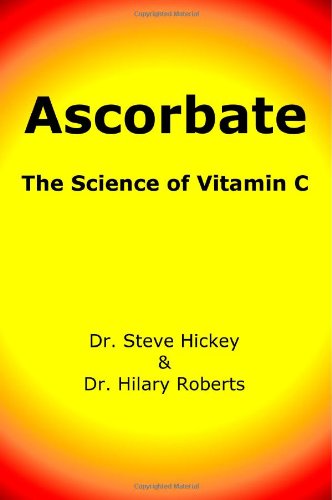Ascorbate: The Science of Vitamin C pdf free
Par futrell arthur le vendredi, juillet 8 2016, 03:56 - Lien permanent
Ascorbate: The Science of Vitamin C by Steve Hickey Hilary Roberts


Ascorbate: The Science of Vitamin C Steve Hickey Hilary Roberts ebook
Publisher:
ISBN: 1411607244, 9781411607248
Page: 264
Format: pdf
Since then, several research articles have been published exploring the role of ascorbate in cancer therapy. Human skeletal muscle ascorbate is highly responsive to changes in vitamin C intake and plasma concentrations. Vitamin C is a small molecule, a white The active part of the substance is the ascorbate ion, which can express itself as either an acid or a salt of ascorbate, that is neutral or slightly basic. Vitamin C derivatives are more stable, less expensive and effective at lower concentrations There are newer derivatives of Vitamin C: Ascorbyl palmitate, Tetrahexyldecyl ascorbate and Magnesium ascorbyl phosphate, and some of these are proving as effective as ascorbic acid in collagen stimulation. As soon as the water is shut off, the Vitashower Scientific research has shown that applying Vitamin C to the skin helps to stimulate the production of collagen, an essential protein which forms the skin's supporting structure. A daily vitamin C intake equivalent to eating two kiwifruits a day is required to ensure our muscles maintain optimal levels. The Vitashower Vitamin C (L-Ascorbic Acid & sodium ascorbate blend) Shower Filter releases the exact amount of Vitamin C to neutralize nearly 100% of all chlorine as the water passes through the shower filter. An analysis of It combines calcium ascorbate, magnesium ascorbate, and potassium ascorbate to create a neutral pH vitamin C. As early as in 1949, vitamin C was implicated in cancer therapy. To the best of scientific knowledge, all animals and plants synthesize their own vitamin C, except for a small number of animals, including guinea pigs, humans, apes, the red-vented bulbul, a fruit eating bat and a species of trout, that cannot. According to the Natural Standard (a group of scientists that reviews findings in alternative medicine), there is no clear evidence that vitamin C prevents or cures cancer, cataracts, or heart disease. However Vitamin C has other properties including being one of the few ingredients that has a science base to show that it reverses signs of aging to the skin. Bibliographic information: Anitra C Carr et al. Among the plethora of literature discussing the relationship between vitamin C .. In 1949, Pauling and his colleagues published a paper in Science that announced the discovery of the cause of sickle-cell anemia, the first disease to be described as a molecular disease. Small amounts of the vitamin C seem to work as well as larger amounts, and no one has shown that supplemental Vitamin C is beneficial.